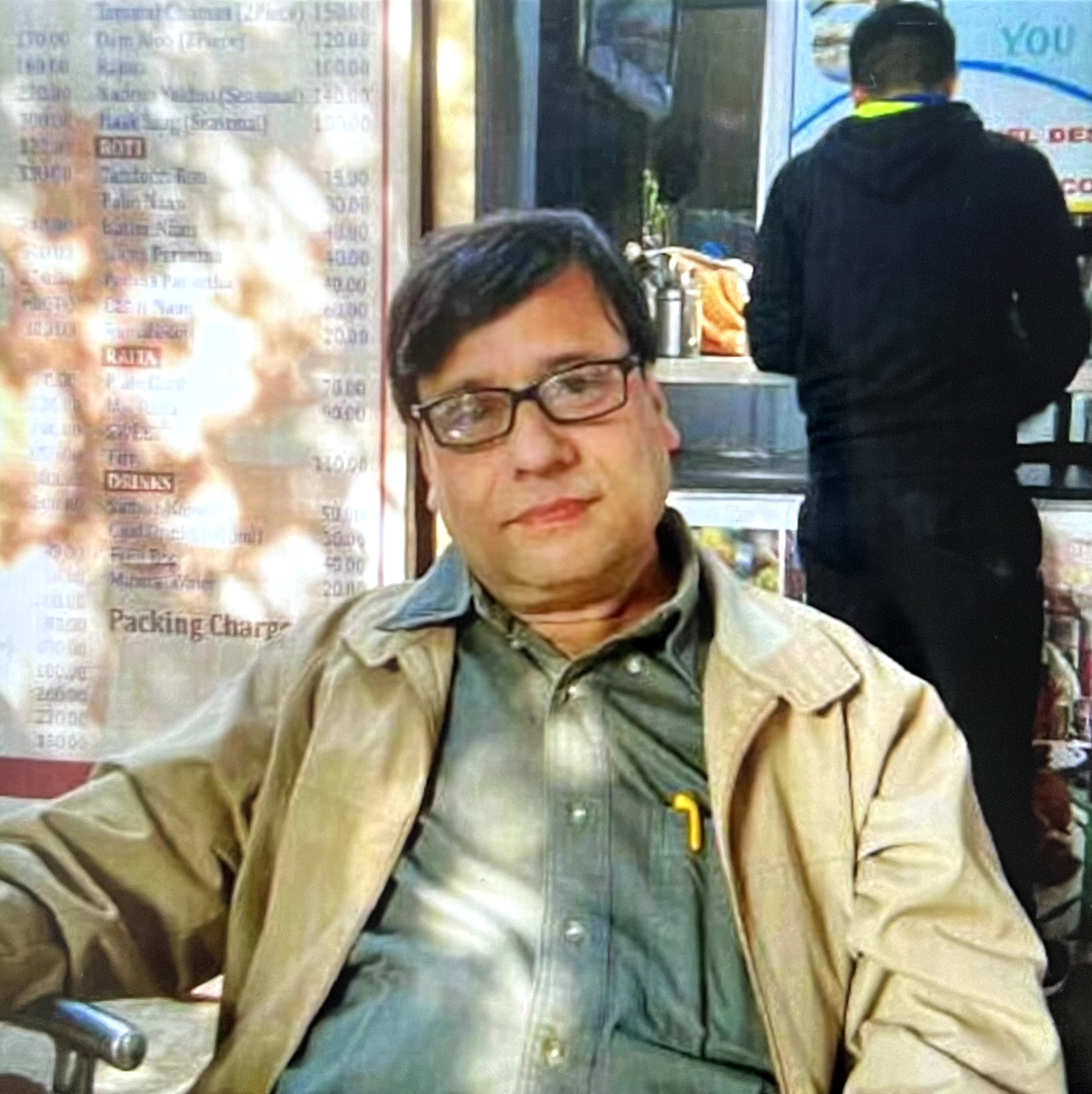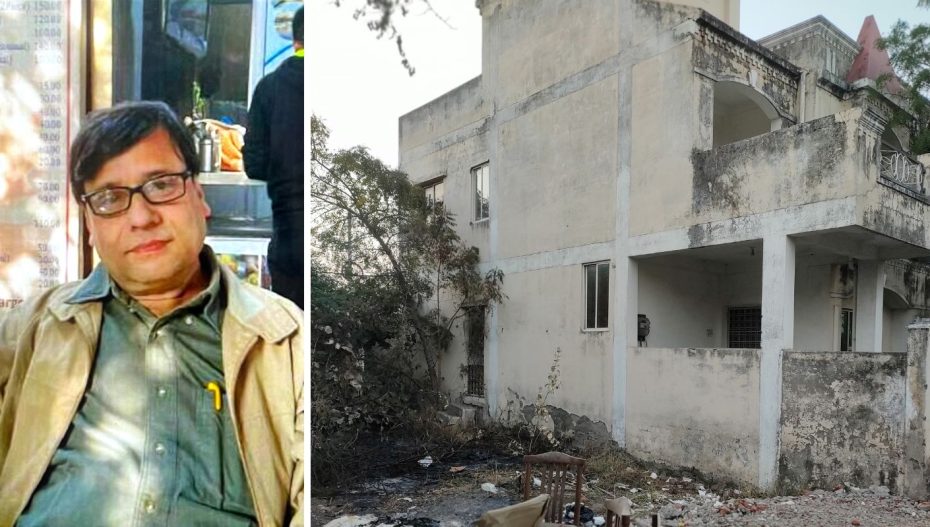It is unusually quiet at the Bhadbhada crematorium in Bhopal this afternoon in March, an oppressive summer lurking, the congenial winter long gone. Not a soul in sight. I saunter past the empty rows of cast iron cremation stands. Only at the farther end — where the lone electric incinerator stands — a couple of staffers, seated on a parked two-wheeler, chat indifferently, their nonchalance stemming from regular dealing with the dead.
Three weeks ago, I was here for the last rites of a senior colleague, the place teeming with pall-bearers and mourners. Every stand was in use, bodies stacked on firewood, either lit or about to be. Someone wondered, joking in that sombre setting, if another COVID wave had sneaked upon us. Some recalled the nightmares of the pandemic.

Crowded or not, a crematorium can make one feel lonely and melancholy. I am made acutely aware of this as I wait to say a final goodbye to Bhaskar Sinha, a friend of but a few months, one with an inner life rich in literature and cinema, one whom I met but a few times, one with whom I had little in common.
My awkward wait ends with the arrival of an ambulance. Parking it near the steps leading to the incinerator, the driver gets down jauntily and joins the staffers. I wonder if the vehicle is empty.
It isn’t.
I peep inside. A body all wrapped in plastic, on a rickety stretcher. I ask the driver if it is Bhaskar Sinha, and he nods indistinctly. I am sure he’d have reacted the same to any name. In dry disengagement, his eye and mind on the road ahead, not on who rides with him, he has brought another body here. Today it’s from the All India Institute of Medical Sciences, hardly 10 km away. Today Bhaskar Sinha, tomorrow — perhaps even a few hours later —another.
A desolate crematorium, an indifferent hearse driver — Bhaskar Sinha could well have chosen these coincidences. A bachelor and one who kept to himself much of the time, death came for him exactly the way he feared, his body found in his rented duplex three days after he died. He had once told a friend — one of the very few he had — that he was afraid his death would be announced to the world by the smell of his decaying body. But for that friend, who sent someone to check on Bhaskar Sinha when he did not respond to calls and messages, the prediction would have proved prophetic. The police had to break a wooden partition leading to the first floor to find him.
It’s two more days before he is brought to the crematorium, to be swallowed up in the incinerator in the presence of six people — two close relatives and four people who had met him in recent months.
The duplex appeared to be a hideout more than a home. Retiring as a senior DGM with BHEL in Delhi, the 68-year-old had chosen Bhopal because it suited his pocket and pace. Like in Delhi, he was a regular at film and lit fests and book exhibitions. But the last few steps to his duplex — the last in a lane, on the very edge of the colony boundary, with a neighbouring unit vacant and ungroomed as his own — probably signified a slow fadeout to the outside world as he dissolved himself in his books and his films. No wonder he kept the main door and most rooms locked.
He guarded his privacy and would not want anyone to see how he lived — among piles of books, magazines, and discs scattered across the small, unkempt rooms. A Satyajit Ray fan, he’d buy everything by or about the master — story collections, prints of sketches, biographies, critical works. He not only bought books, but also revised editions of his favourites. The police had to make a way around books, unopened cartons to reach his body.
He never hired a household help or cook because he didn’t want to be disturbed or maybe he was afraid of something untoward happening. He believed that society treats and judges bachelors differently.
I first met him at the screening of Pather Panchali, organised by Cine Classic: The Film Club of Bhopal. Our objectives in joining the club were starkly opposite: mine, learning to appreciate cinema; his, sharing his enthusiasm and wealth of knowledge of Bollywood, Hollywood, Bengali cinema, and world cinema.
He was excited to know I was a journalist, and noted my number in a small pocket diary, which he said he trusted more – than his mobile perhaps? I thought he’d simply forget me and my number. I was wrong. I learnt later that he was a calligraphist; my name and number probably received the best inscription they ever will.
During discussions after the weekly screenings, he’d be in his element, jovial and mingling with youngsters and the middle-aged with equal ease, always adding value without imposing himself. In the club’s WhatsApp group, he’d fill in everyone with a wealth of little known facts about films and movie and theatre personalities. His last posts were after the death of Kumar Shahani.
We met next at a heritage walk through Old Bhopal on a wintry morning. Well-dressed as usual, and sporting his big smile and his sling bag. It was a pleasant surprise, for I suspected he already knew the places and their history but turned up only because he loved to take part in such activities.
As I wait for the funerary rites to be completed, my mind roams to what little we shared. We’d joke about being owners of small, old cars, a dwindling minority. And yes, even a newbie film buff like me shares a cinematic connection with him, albeit an amusing one.
When I watched the first show of Mujib: The Making of a Nation on the day it was released in October last year, I happened to be the only person in the audience when the film began and ended. When I told him that, he chuckled appreciatively. But he bombed my claim to that singular achievement: he too had seen the movie, alone, in another hall!
My reason for watching the first show was prosaic. The workshop where I had to leave my vehicle for a tune-up was near the cinema hall, and the cab fare home and back would have cost roughly the same as the movie ticket. Bhaskar Sinha had no reason to make a virtue of necessity, for he was a seasoned film buff who might have done many a first-day-first-show before; besides, knowing the history of Bengal and Bangladesh quite well, he’d have had more reasons to be eager to see how the film treated the subject.
I think of the contradiction between his private and public personas. The way he shared anecdotes, he gave the impression he had many friends — real ones and those he’d met via social media. That wasn’t true. He’d interact with just a handful of people — and strictly within limits. Perhaps some of his relatives — none of whom lived in Madhya Pradesh —were exceptions: he’d apparently talk to them at length when he called them. But the few who got a chance to occasionally drop him home never once made it to his private space.
In his colony, except for a few people who had interacted with him and found him decent and erudite, no one knew of his existence. His immediate neighbour had spoken to him on occasion but they’d never visited each other’s homes. “He must have been a genius,” the neighbour told me. “Probably, he did not want to mingle with others as that would have meant lowering the bar.”
This is no lamentation for the present age — just that Bhaskar Sinha chose seclusion, dying in his sleep, probably of cardiac arrest. The autopsy ruled out foul play. Maybe he’d called out for help. Maybe he didn’t have time even for that.
In death as in life, he was alone.
Also Read: Popular AI Tool ChatGPT’s Power Consumption is a Shocking Reality












